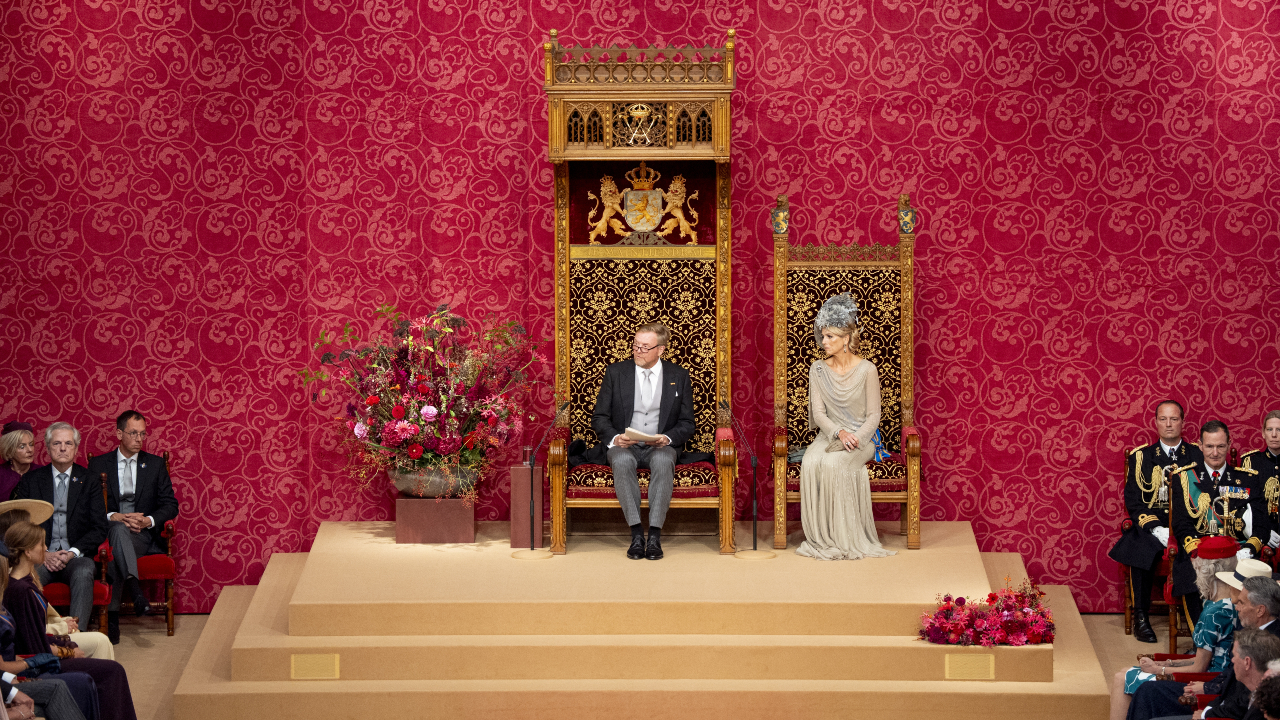King: polarisation and paralysis are obscuring real concerns

King Willem-Alexander made a thinly veiled plea for all sides to end the political paralysis that has engulfed The Hague in the last year in his speech to mark the opening of parliament.
The king said the reduction of the cabinet to a rump of two parties with just 32 seats in parliament meant that “the yardstick of government policy has an even shorter reach than usual”.
But at the same time, “we cannot simply press ‘pause’ on people’s day-to-day concerns about work, communities and housing,” he said.
“People want an income that will see them through to the end of the month, a safe and familiar neighbourhood, and a home for themselves and their children.”
The Speech from the Throne – delivered at the Koninklijke Schouwburg in The Hague because of the long-term renovation of the parliament complex – was shorter than usual at 1,700 words, recognising the cabinet’s caretaker status.
The king said polarisation – “on the street, online, at our universities, and not least in The Hague” – and the spread of “entrenched opinions” was making it harder to reach decisions that people could work with.
“Debate and differences of opinion are part of a living democracy,” he said. “But so too is having the willingness to see beyond our differences and the maturity to reach out to each other.”
Immigration
The king’s speech echoed prime minister Dick Schoof’s appeal after the cabinet collapsed in June for parties not to hold up essential reforms on migration, healthcare and living standards.
The government would continue to prioritise controlling immigration in the final weeks before parliament is dissolved for the elections, with the king calling it “one of the biggest concerns in our country”.
Plans to compensate people for a series of government-driven injustices such as the impact of gas drilling in Groningen, the punitive sanctions against families who were wrongly accused of benefit fraud, and the mismanagement of incapacity benefits, also needed to be “pursued with the greatest possible vigour”.
The nitrogen pollution crisis needed to be resolved so that restrictions on emissions near conservation zones could be lifted, allowing large-scale housing and infrastructure projects to go ahead.
The interests of agriculture, industry and nature needed to be balanced, the king said, with the government committed to both meeting nitrogen emissions targets and ensuring food security “in times of geopolitical turmoil”.
Reclaim the night
The king acknowledged concerns about women’s safety in the wake of the murder of a 17-year-old girl by a cycle path near Amsterdam and a resulting campaign to “reclaim the night”.
“We cannot accept that women and girls feel unsafe on the streets, or people who wear a yarmulke or a headscarf,” he said. “Or that two people of the same sex cannot walk hand in hand.”
The Netherlands was also being challenged by “rapid and far-reaching geopolitical developments” such as the growth of artificial intelligence, trade tariffs and shifting economic power relations – “big questions which have no quick and easy answers”.
The threat of war, brought home at the Nato summit in The Hague in June, had forced European nations to ramp up defence spending, while the king also stressed the need to find a solution to the “humanitarian crisis” in Gaza.
But he said the Netherlands could “press more effectively for the achievement of a ceasefire when it works in concert with international partners”, an implicit rejection of parties that have argued the Netherlands should take the initiative by imposing its own sanctions on Israel.
The full text of the speech is available here on the royal household’s official website.
Thank you for donating to DutchNews.nl.
We could not provide the Dutch News service, and keep it free of charge, without the generous support of our readers. Your donations allow us to report on issues you tell us matter, and provide you with a summary of the most important Dutch news each day.
Make a donation